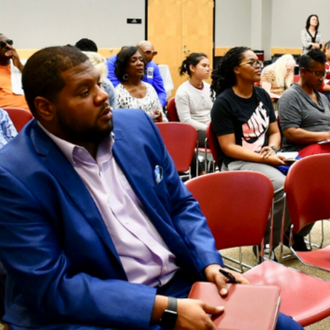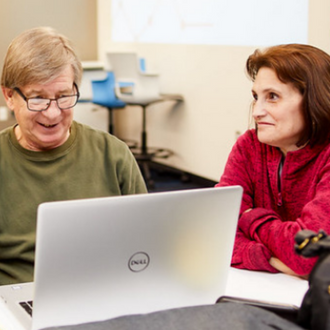Business at the Library, Who Knew?
by Megan Engles, Small Business Specialist, Mid-Continent Public Library

When I was hired to work as part of the Square One Small Business Services team, I had a good understanding of what my job would be. At least I thought I did. I knew that we regularly met with local small businesses, entrepreneurs and nonprofit organizations to guide them in their decision making processes and connect them with local and internal resources. What I misunderstood, however, was what exactly some of those resources were.
When you think of library resources, what is the first thing that comes to mind? If your answer was books, congratulations! You are not alone. In fact, if we were competing together on Family Feud, you would have just answered this question with the number one most popular response. Who doesn’t think of books when they think about the library? What I have found, though, is we are exceedingly more than books. Don’t get me wrong, I love books! Over the years I have read countless books that have been extraordinary resources for me, personally, covering a wide range of topics. However, I am convinced that books are not the end-all-be-all of library resources. (Just don’t tell my local librarians I said that.)
Over the last two months, I have been exposed to mind-blowing online resources. With a few simple clicks and a library card number, our patrons have access to training platforms, statistics, demographics, step-by-step instructions on business plans and legal documents, education options on a variety of interests, in-depth information on almost any topic you could imagine, subscriptions to desirable journals and publications, and so much more. With these resources being entirely online, library members don’t even need to be inside a physical branch anymore to gain access. As long as they have a library card, they have access from anywhere around the world.
You want to know the best part about these online resources? With a library card, anyone in the community has access to these services at absolutely zero cost. That’s right. It is all completely free. Without this option, people would be forced to spend time and money on expensive consultations, paying out of pocket for high-priced databases and subscriptions, or potentially taking college courses for specific areas of interest. The fact that we not only have access to this information internally, but can offer it to members of our community for no cost to them is insane to me. I don’t know anywhere else that offers this value. The library has certainly won some major “cool” points for this offering alone!
Businesses are people and they have more than one problem or obstacle. The help we give is so much more impactful because we recognize the whole person and strive to support that whole person.
Another misconception I had about library resources was the programs and classes offered. Of course I knew about book clubs, craft classes and storytimes. What I wasn’t aware of, however, was that careful thought and planning was going into recruiting local experts to teach classes, sit on panels and be living, breathing sources of information to people interested in similar lines of work or certain areas of business development. This interactive learning platform offers the ability to ask questions and gain a deeper understanding by hearing firsthand accounts of experience and expertise along with guidance on best practices or ways to avoid common industry mistakes. Certain classes can also help set realistic business expectations for attendees and answer questions for them that they may not have even known they had.
The beauty of life in Kansas City is that we are a city full of entrepreneurs. Not only that, but we are a city full of entrepreneurial experts who truly want to help their fellow man. More often than not the small business owners you encounter here are eager to share with other small business entrepreneurs a realistic view of what business ownership looks like. Many of those people willingly serve as a sounding board and mentor for members of the community who are trying to find a way into their industry. Rather than compete with others, we see them build and encourage one another. That is something you don’t see every day. Especially in competitive business markets. Having access to experts who are willing to share their knowledge with our members is a game changer for us and what we are able to offer. Our relationships and partnerships with those people allow us to take our offerings beyond anything we could do on our own. And we are incredibly grateful to each one of them.
Something I’ve learned more about are common, improper uses of language or terminology associated with our business patrons. “Business” is such a broad term and seems all encompassing. However, it is crucial to understand who our individual audience truly is and anticipate their needs in order to tailor our services to them. For example, what we offer to someone involved in a startup may be different than someone who is an established business owner. Those needs would then change for someone who is operating a nonprofit, and again for a local, immigrant entrepreneur wanting to own a food truck. Understanding the needs of those clearly-defined consumers and then providing solutions to problems they’re not even aware exist is something we strive to do day in and day out. Being able to understand their roles through use of proper terminology helps give us better insight into who we are dealing with, where we are going and what our focus needs to be.
On top of all the other things I’ve learned about my library system, I’ve also learned we aren’t the only library offering this kind of help. My system is actually part of a cohort of public libraries that support small businesses and entrepreneurs across the country and Canada. The Urban Libraries Council is focusing on spreading the best practices for serving entrepreneurs and small businesses just like they helped libraries better challenge the digital divide. Through our time with the other library systems, an overarching theme has emerged that validates why libraries are such a good place for this type of customer to come and get help. Businesses are people and they have more than one problem or obstacle. The help we give is so much more impactful because we recognize the whole person and strive to support that whole person. That is a level of service that small businesses do not receive from the Small Business Association or even their local Chamber of Commerce.
Megan Engles serves on the Square One Small Business Services team of the Mid-Continent Public Library as a business specialist. She works alongside a growing team to cultivate small business culture and entrepreneurship in and around the city. Megan has personal experience with small business ownership with her former career in the field of aesthetics. Her background is also in event coordinating and management and she continues to use those skills as she works with the Square One team to develop and redefine future, community programming.
Related Articles

Helping Small Businesses and Nonprofits Navigate the Pandemic in Greensboro
Greensboro Public Library
Discover how Greensboro Public Library developed a new COVID-19 Small Business & Nonprofit Resource Guide to offer local, state and federal resources to help small businesses and nonprofits navigate the pandemic.
Learn More

Understanding Our Business Value in Omaha
Do Space
As the nation's first technology library, explore how Do Space used the Business Value Calculator to estimate the impact of their business services.
